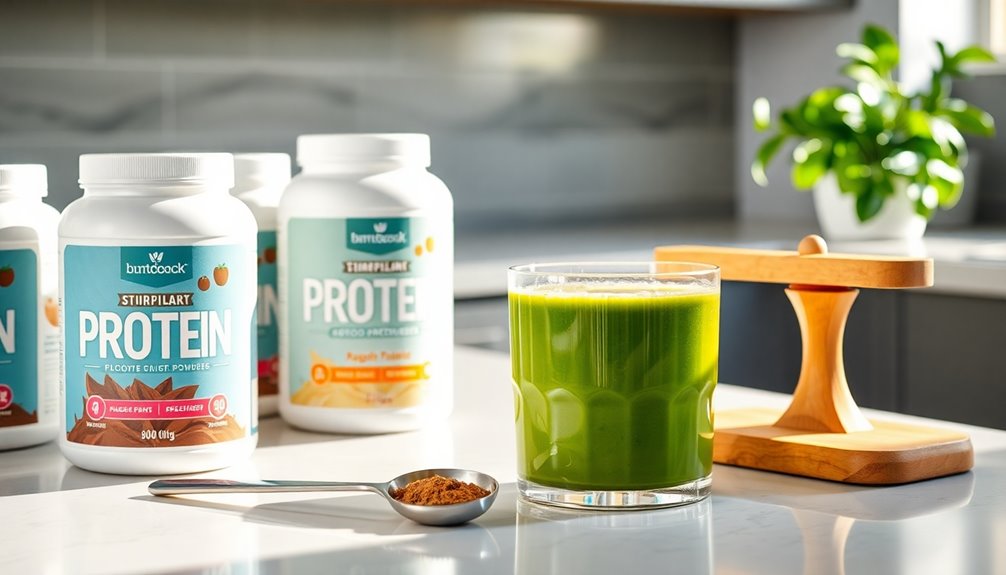To choose the right protein powder for weight loss, start by understanding your specific goals and daily caloric intake. Evaluate protein sources—consider plant-based versus animal proteins based on your dietary preferences. Always check nutritional labels for protein content, added sugars, and avoid fillers or harmful additives. Pay attention to ingredient quality and opt for products with concise lists. Additionally, look for reputable brands with positive consumer reviews and transparent practices. Price matters, so balance affordability with quality. By following these steps, you'll find a protein powder that supports your weight-loss journey effectively and sustainably. More insights await you ahead.
Key Takeaways
- Assess your weight loss goals and daily caloric intake to choose a protein powder that fits your dietary needs.
- Evaluate protein sources, prioritizing high-quality animal or plant-based options that align with your nutritional preferences.
- Check nutritional labels for protein content, added sugars, and avoid fillers to ensure quality nutrition.
- Consider brand reputation and consumer reviews to gauge product effectiveness, taste, and overall value.
- Opt for natural ingredients and concise labels, avoiding harmful additives or unnecessary calories for cost-effective choices.
Understand Your Goals
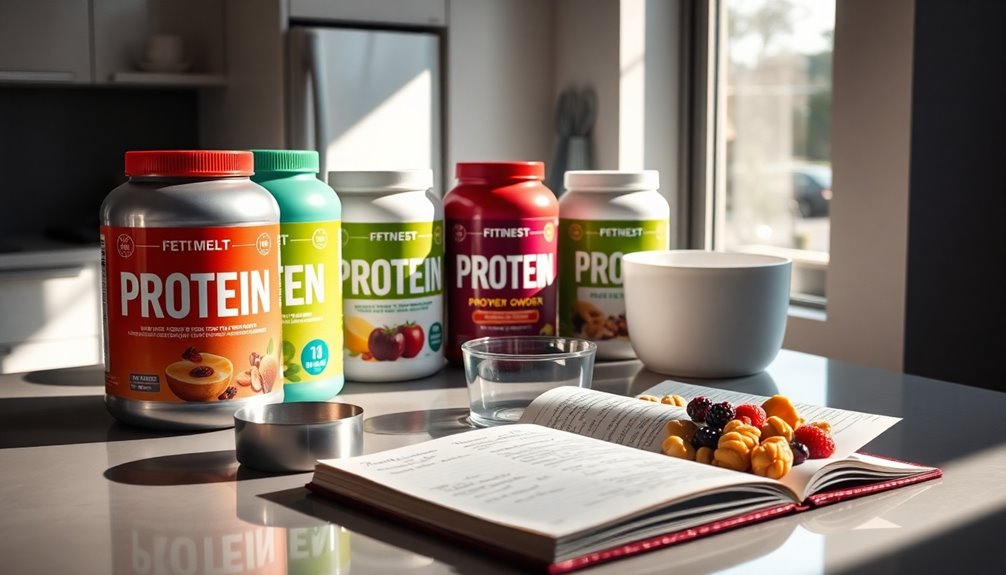
When it comes to choosing a protein powder for weight loss, understanding your goals is vital. You need to clarify what you aim to achieve—whether it's losing weight, building muscle, or improving your overall fitness. Your caloric intake plays an essential role in this process. If you're consuming more calories than your body burns, weight loss becomes a challenge. Hence, selecting a protein powder that fits into your daily caloric limit is necessary.
Incorporating protein powder into your diet can help you manage hunger and maintain muscle mass while you're shedding pounds. However, it's important to choose a powder that aligns with your lifestyle and exercise routine. A plant-based diet can also provide essential nutrients while supporting weight loss efforts.
If you're hitting the gym regularly, you might want a protein source that provides adequate amino acids to support muscle recovery. On the other hand, if you're more focused on general weight loss, a lower-calorie protein option might suit you better.
Evaluate Protein Sources

Assessing protein sources is crucial for selecting the appropriate protein powder for your weight loss journey. You'll want to contemplate whether you lean towards animal or plant-based proteins, as each has unique advantages and drawbacks.
Animal proteins, such as whey and casein, typically boast higher protein content and contain all essential amino acids, making them effective for muscle repair and growth. If you're seeking rapid absorption, whey protein is a popular choice.
On the flip side, plant-based proteins, like pea, hemp, and brown rice, offer a great substitute, especially if you're vegan or lactose intolerant. While they may have a slightly lower protein content per serving, they offer additional benefits, such as fiber and a variety of vitamins and minerals. Additionally, plant proteins can foster a sense of belonging within a community that prioritizes sustainability and animal welfare.
When deciding between animal vs plant proteins, reflect on how each aligns with your dietary preferences and ethical viewpoints. Both types can assist you in reaching your weight loss goals, but they may impact your body differently.
For instance, some individuals might discover that plant proteins are easier to digest, while others may favor the fulfilling effects of animal proteins.
Ultimately, it's about what best suits your lifestyle and dietary requirements. By assessing the protein sources available, you're one step closer to discovering the appropriate protein powder to bolster your weight loss journey effectively.
Check Nutritional Labels
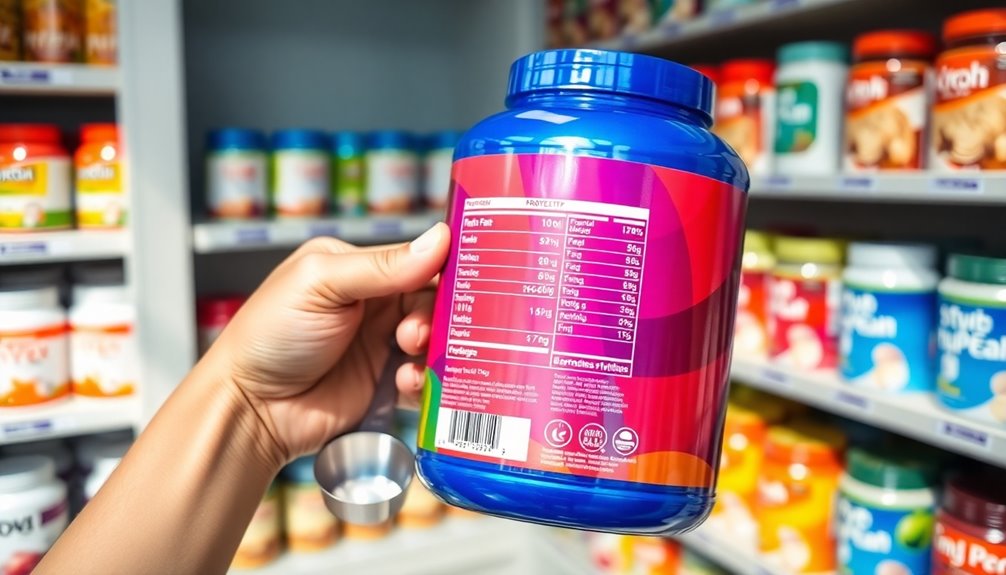
Checking nutritional labels is necessary for making informed choices about protein powders, especially when weight loss is your goal. When you look at the label, focus on the nutritional value provided per serving. You'll want to pay attention to the protein content, as it's pivotal for maintaining muscle mass while shedding pounds. A good protein powder should offer 20 grams or more of protein per serving.
Don't forget to check for added sugars and calories. Some brands add sweeteners that can increase calorie counts, which might derail your weight loss efforts. Aim for powders with minimal added sugars to keep your caloric intake in check.
Brand comparison is also essential. Different brands may offer varying protein sources and nutritional profiles. For instance, whey protein often has a higher biological value than plant-based options, but if you're lactose intolerant, a pea or rice protein might be a better fit. Comparing these labels can help you find a protein powder that aligns with your dietary needs and weight loss goals.
Lastly, consider the presence of any fillers or artificial ingredients. A cleaner label with fewer additives generally indicates a higher-quality product. By examining these factors, you'll be empowered to make choices that not only support your weight loss journey but also fit seamlessly into your lifestyle. Remember, you're not alone in this—many others are on the same quest for health and wellness. Additionally, it's wise to prioritize whole food sources of protein to avoid harmful chemicals often found in processed powders.
Consider Flavor and Texture
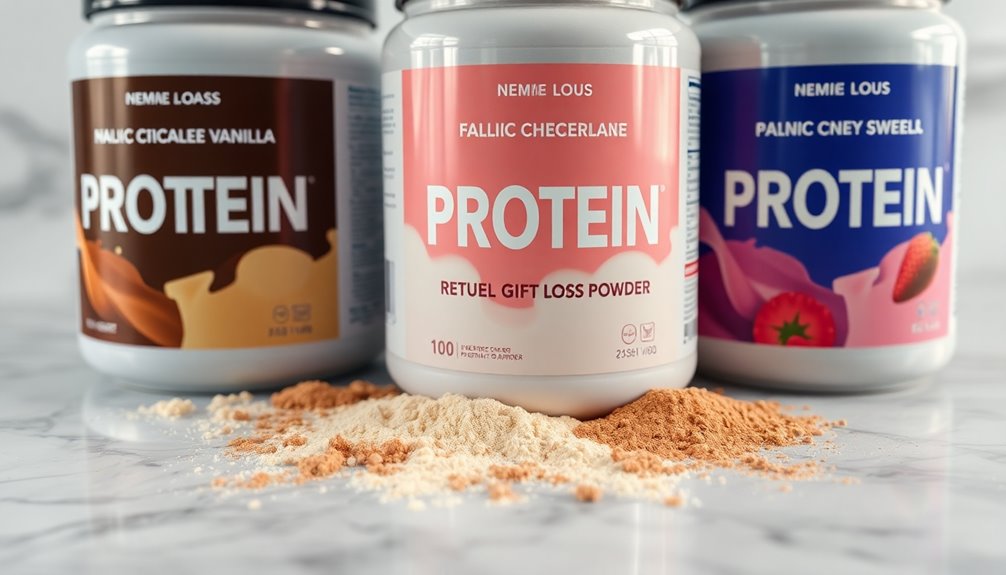
Flavor and texture play significant roles in your experience with protein powder, especially if you're incorporating it into your daily routine for weight loss. You'll want a product that you genuinely enjoy, as this will encourage consistency in your diet. If you're sensitive to certain flavors or have allergies, make sure to choose a protein powder that caters to your needs. There are plenty of options available, from chocolate and vanilla to fruit-flavored blends, so you can find something that suits your taste buds.
Texture is equally important. Some protein powders mix smoothly into liquids, while others can be gritty or chalky. If you're particular about how your shake feels, it's worth trying a few samples to see which ones you prefer. A smoother texture can make your shakes more enjoyable, which can help you stay on track with your weight loss goals.
When considering flavor and texture, you should also take into account your dietary preferences and any dietary restrictions you might have. For instance, if you have lactose intolerance, look for dairy-free options like pea or rice protein. Ultimately, the right protein powder shouldn't only fit your nutritional needs but also delight your palate. By taking the time to choose a powder that aligns with your flavor preferences and texture sensitivity, you're setting yourself up for a more satisfying and effective weight loss journey. Additionally, drinking water from SlimCrystal bottles can further enhance your weight loss efforts by boosting energy levels and supporting your overall health.
Assess Ingredients and Additives
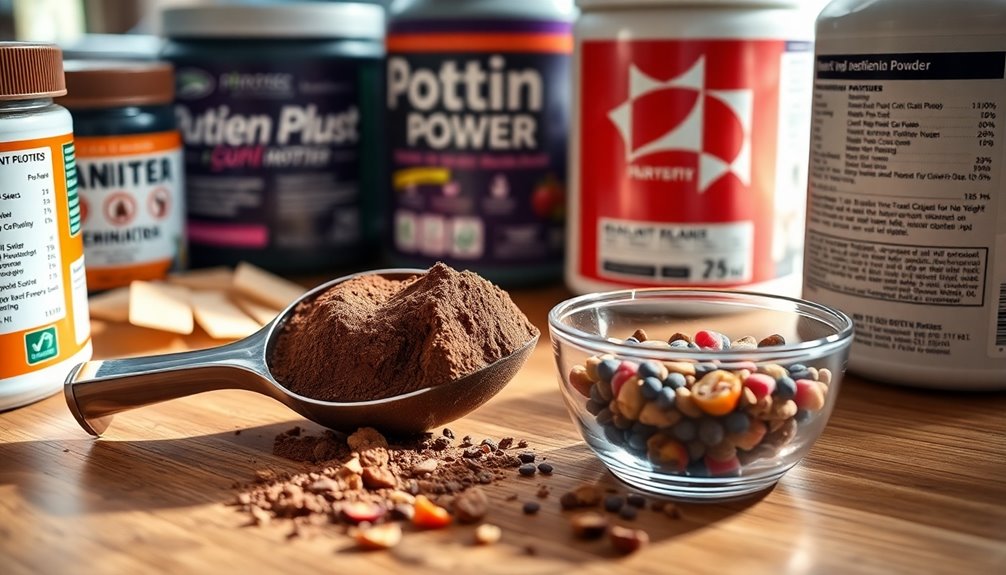
When selecting a protein powder for weight loss, carefully examine the ingredients and additives listed on the label. It's crucial to scrutinize the components to ensure you're providing your body with the highest quality nutrition. Begin by seeking out protein powders that contain natural ingredients. These are typically devoid of artificial pesticides and harmful chemicals, making them a healthier option. Natural sources like whey, pea, or brown rice protein not only supply necessary amino acids but also promote your overall well-being.
Additionally, be cautious of detrimental additives that may find their way into protein powders. Components such as artificial sweeteners, colors, and preservatives can hinder your weight loss progress by introducing unnecessary calories or triggering cravings. Instead, opt for products with organic sweeteners like stevia or monk fruit. They provide the desired sweetness without the adverse effects of artificial alternatives.
Furthermore, pay attention to fillers and thickeners, which can introduce extra calories and may lack any nutritional value. A concise ingredient list often signifies a purer product—one that aligns better with your objectives.
Ultimately, a thoughtfully chosen protein powder can serve as a valuable asset in your weight loss journey. By prioritizing natural ingredients and avoiding harmful additives, you can make a decision that not only supports your weight loss endeavors but also contributes to your overall health. Therefore, carefully read those labels and make informed choices!
Price and Brand Reputation
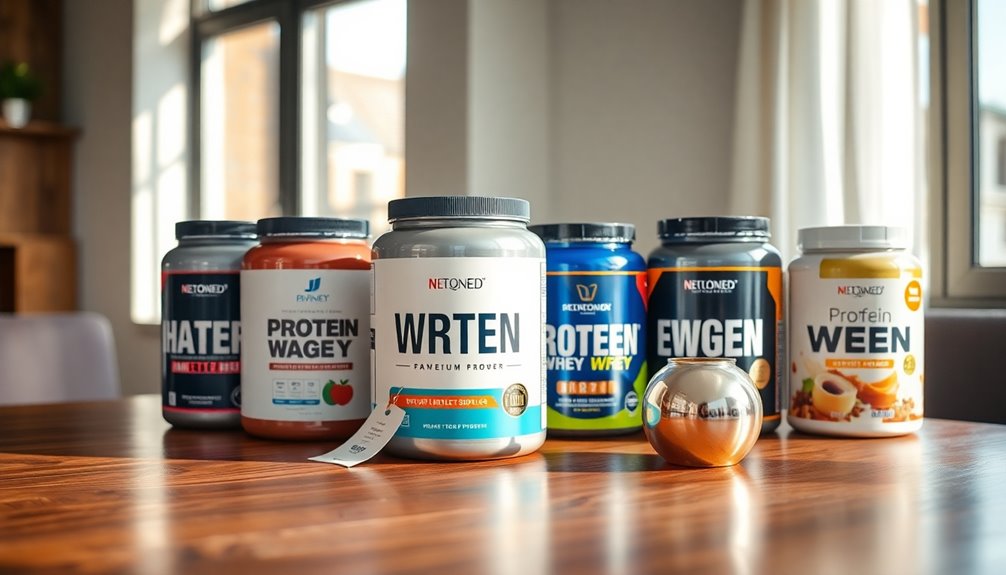
Finding the right protein powder goes beyond just examining ingredients; price and brand reputation also play vital roles in your decision-making process. When you're on a weight-loss journey, it's crucial to find a product that fits your budget without compromising quality. Conducting a cost comparison among various brands can help you identify options that provide the best value for your money. Keep an eye on serving sizes and the number of servings per container, as these factors can greatly influence overall cost.
Brand reputation is equally important. Look for brands that have a history of positive consumer reviews. These reviews offer insights into the effectiveness and taste of the protein powder, helping you gauge whether it aligns with your personal preferences and goals. A reputable brand often invests in quality control and transparency, ensuring that what's on the label matches what's in the product.
Trust is key when it comes to nutrition, so consider brands that have third-party testing or certifications. This adds an extra layer of assurance that you're choosing a reliable product. While it's tempting to gravitate toward the cheapest option, remember that low cost can sometimes indicate inferior quality. Additionally, choosing a protein powder that supports your metabolism can enhance your efforts in burning body fat effectively.
Aim for a balance between affordability and a brand's credibility. By taking the time to assess both price and reputation, you're more likely to find a protein powder that supports your weight-loss journey effectively.
Frequently Asked Questions
Can Protein Powder Replace Whole Food Protein Sources Entirely?
You might wonder if protein powder can fully replace whole foods. While protein powders can supplement your diet, they shouldn't completely substitute whole foods. Whole foods offer essential vitamins, minerals, and fiber that protein powders lack, helping you maintain a well-rounded nutrition.
For best protein balance, consider using protein powder as a convenient addition rather than a replacement. Embracing a variety of food sources guarantees you get the nutrients your body needs.
How Much Protein Do I Need Daily for Weight Loss?
When considering your protein intake for weight loss, visualize the balance between muscle maintenance and fat loss. Generally, you should aim for about 1.2 to 2.2 grams of protein per kilogram of body weight, depending on your activity level. This range supports weight management while helping you feel fuller longer.
Is It Safe to Use Protein Powder During Pregnancy?
Using protein powder during pregnancy can be safe, but consulting your healthcare provider first is vital. They can help you determine if it fits your dietary needs. If you're breastfeeding, make sure your protein powder is free from harmful additives.
Some studies suggest a balanced protein intake may even support fertility, but always prioritize whole foods. Remember, staying informed helps you make the best choices for you and your baby's health.
Can Protein Powder Cause Digestive Issues for Some People?
Imagine your stomach as a gentle sea, but certain protein powders can stir up waves. Some folks experience digestive issues like bloating, often due to potential allergies or intolerances to ingredients like whey or soy. If you've got sensitivities, it's wise to choose plant-based options.
Listen to your body; it'll guide you through the choppy waters. Remember, every person's unique, and finding what works for you is key to smooth sailing.
Should I Take Protein Powder Before or After Workouts?
When deciding whether to take protein powder before or after workouts, consider the timing benefits. Consuming it before your workout can provide you with energy and support muscle repair during exercise.
On the other hand, taking it afterward helps replenish your muscles and aids recovery. Ultimately, it depends on your routine and goals. Experiment with both options to see which fits your needs best, fostering a sense of belonging in your fitness journey.
Conclusion
In your quest for the perfect protein powder to support your weight loss journey, remember that a thoughtful choice can make all the difference. By aligning your selection with your goals, understanding the sources, and being mindful of ingredients, you're not just picking a supplement; you're embracing a healthier lifestyle. With a sprinkle of flavor and a dash of quality, you'll find the ideal companion to help you glide smoothly toward your wellness aspirations. Happy blending!

